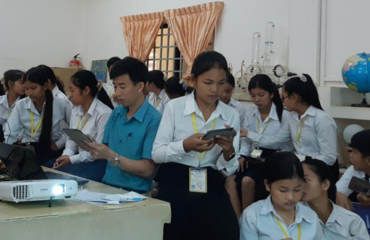
The Technology-enabled Innovation in Southeast Asia (TIESEA) project aims to find solutions as to ‘’what works” in EdTech. The project began in late 2021 with the conducting of national surveys of the EdTech landscape in four countries in the region – Cambodia, Indonesia, Philippines and Vietnam. These were designed to include an overview of the local EdTech situations and to review those interventions that have been successful in improving education outcomes. The detailed country situational analyses in the four countries, which also reported on the results of a teacher-skill survey, have provided a showcase for some of the EdTech suppliers and projects operating in each of the countries.
The leading EdTech players, identified country by country, will be invited to become project partners to work with project implementers to run intervention pilots that will run for one year in each country. The research design will be backed up by rigorous monitoring and evaluation procedures that will check on progress over the course of the year-long projects. Several important criteria will guide the EdTech pilots – they should be affordable, scalable and sustainable at a national level, to the extent that they could become more widely adopted by education ministries at the end of the year-long project intervention. The interventions should be able to demonstrate a positive impact on the quality of learning and the achievements of the students in the participating schools.
During the early part of 2022 workshops are taking place, in the form of webinars, to share the findings of Digital eReadiness Surveys in each country with key government officials and other key stakeholders in the participating countries. This workshop series will culminate in a regional webinar with a wide audience, international keynote speakers and an expert panel. The conference will reflect upon the lessons learned during the past two years of remote learning, as EdTech has had a critical role to play in maintaining learning continuity during the enforced school closures.
As the EdTech interventions proceed over the course of school years 2022 and early 2023 regular updates will be included on the project website.
The lessons learned and the results of the EdTech interventions will be collated, analysed, and presented at a major in-person international conference and EdTech event to be held in the region in September 2023. This conference is aimed to be a capstone event to which an international audience of policy-influencers and decision-makers will be invited.
All the major international EdTech players will be represented, and, under the aegis of the Asian Development Bank and the Japanese Fund for Poverty Reduction, the project implementers will focus on, and highlight, the key elements that make EdTech interventions successful.
EdTech solutions have a huge role to play in the contributions they can make as education systems begin to be remodelled to address the twin challenges of the Fourth Industrial Revolution and the ongoing challenges of remote learning and school closures.


